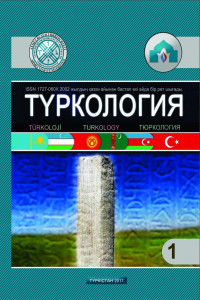ABAY VE LERMONTOV’UN ESERLERİNDE UYUMLULUK
Makalenin merkezinde, M.Yu. Lermontov’un “Duma” şiiri bulunmaktadır. Şairin yaratıcılığında bu eserin yeri büyüktür. “Duma” soyun geleceğiyle ilgilenen şairin düşüncelerini yansıtan derin manalı bir eserdir. Abay bunu Kazakçaya çevirmiştir. Makalede iki şair arasındaki yaratıcılık bakımından uygunluk konusu “Duma” şiirinin manası, içeriği ve onun Kazak diline çevirisi ile ilişkisi ile ele alınmıştır. M.Yu. Lermontov, döneminin toplumsal durum ve zamandaşlarından memnun değildir. O, kendi dönemi ve ondaki toplumsal bilincin ötesine geçmiş entelektüel bir şairdir. Rus toplumunun bugünü ve geleceği onu tedirgin etmektedir. “Duma” bu gibi eleştirel düşünceden doğmuş derin manalı bir eserdir. M.Yu. Lermontov gibi Abay da kendi zamanının eksikliklerini görüp bunları acımasız bir şekilde ortaya koymuştur. Abay beşeriyet konusundaki düşünceleri ile insanla zamanı düzeltmeyi arzulamıştır. Makalede iki şairin ortak düşünceleri bir şiirin konusu ve çevirisi temelinde incelenmiştir.
Anahtar Kelimeler:
Abay, M.Yu. Lermontov, Duma, Düşünce, Kaygı, Şiir, Toplum, Nesil, Gelecek, Çeviri, Uyum
Continuity in the Work of Abai and Lermontov
The content of the article is based on the poem "Duma" by M.Y. Lermontov. It occupies a special place in the poet's work. "Duma" is a work with a deep and rich content, reflecting the thoughts of the poet, concerned about the future of his generation. Abai translated this poem into the Kazakh language. This article examines the problem of the creative continuity of the two poets, associated with the translation of the "Duma" into the Kazakh language and its ideological and thematic content. M.Y. Lermontov was never satisfied with the current social situation and the people he was surrounded with. He was too sophisticated and innovative poet for his time. He was deeply anxious about present and future of the Russian society. “The thought” is a work with profound meaning as a result of his criticism. Just as M.Y. Lermontov Abay mercilessly criticized inadequacies of his living time. Abay tried to remedy people and their morality with his humanistic philosophy. The article depicts common ideas and philosophy of the both poets on the basis of contents and translation of one poem.
Keywords:
M.Y. Lermontov, Abai, "Duma", Thought, Sadness, Poem, Society, Generation, Future, Translation, Continuity.,
___
- 1. Пушкин А.С. Евгений Онегин. – Москва: Художественная литература. 1970. –368 с.
- 2. Лермонтов М.Ю. Сочинения. ІІ т. – Москва: «Правда». 1990. –704 с.
- 3. История русской литературы ХІХ века. – Москва: Государственное учебно-педагогическое издательство министерства просвещения РСФСР. 1963. –728 с.
- 4. Белинский В.Г. Статьи о Пушкине, Лермонтове, Гоголе. – Москва: Просвещение. 1983. –272 с.
- 5. Әуезов М. Шығармалар жинағы. ХХ том. – Алматы: Жазушы. 1985. – 496 б.
- 6. Ахметов З. Абайдың ақындық әлемі. – Алматы: Ана тілі. 1995. – 272 б.
- 7. Абай (Ибраһим Құнанбаев). Шығармалар жинағы. ІІ т. – Алматы: Жазушы. 1986. – 200 б.
- 8. Лермонтов М.Ю. Сочинения. І т. – Москва: «Правда». 1988. – 720 с.
- 9. Абай (Ибраһим Құнанбаев). Шығармалар жинағы. І т. –Алматы: Жазушы. 1986. –304 б.
- 10. Ысмағұлов Ж. Абай: ақындық тағылымы. – Алматы: Ғылым. 1994. – 280 б.
- References 1. Pýshkın A.S. Evgenıı Onegın. –Moskva: Hýdojestvennaıa lıteratýra. 1970. –368 s.
- 2. Lermontov M.Iý. Sochınenııa. II t. –Moskva: «Pravda». 1990. –704 s.
- 3. Istorııa rýsskoı lıteratýry XIX veka. Moskva: Gosýdarstvennoe ýchebno-pedagogıcheskoe ızdatelstvo mınısterstva prosveenııa RSFSR. 1963. –728 s.
- 4. Belınskıı V.G. Statı o Pýshkıne, Lermontove, Gogole. –Moskva: Prosveshcheniye. 1983. –272 s.
- 5. Áýezov M. Shyǵarmalar jınaǵy. XX tom. –Almaty: Jazýshy. 1985. – 496 b.
- 6. Ahmetov Z. Abaıdyń aqyndyq álemі. –Almaty: Ana tіlі. 1995. – 272 b.
- 7. Abaı (Ibraһım Qunanbaev). Shyǵarmalar jınaǵy. II t. –Almaty: Jazýshy. 1986. – 200 b.
- 8. Lermontov M.Iý. Sochınenııa. I t. –Moskva: «Pravda». 1988. – 720 s.
- 9. Abaı (Ibraһım Qunanbaev). Shyǵarmalar jınaǵy. I t. –Almaty: Jazýshy. 1986. –304 b.
- 10. Ysmaǵulov J. Abaı: aqyndyq taǵylymy. – Almaty: Ǵylym. 1994. – 280 b.
- ISSN: 1727-060X
- Başlangıç: 2002
- Yayıncı: Hoca Ahmet Yesevi Uluslararası Türk-Kazak Üniversitesi
Sayıdaki Diğer Makaleler
AZERBAYCAN TÜRKÇESİ SÖZLÜĞÜNDEKİ İKİLEMELER ÜZERİNE BİR DEĞERLENDİRME
BEŞERİYET İLMİNİN ABAY’IN ESERLERİNDEKİ GÖRÜNÜŞÜ
T.i. KOSHENOVA, Z.r. ESENKARAYEVA
ABAY VE LERMONTOV’UN ESERLERİNDE UYUMLULUK
KARAKALPAK MANZUMESİ VE İ. YUSUPOV ESERLERİNDEKİ METHİYENİN SANATSAL ÖZELLİKLERİ ÜZERİNE
KAZAKİSTAN'IN GÜZEL SANATLARINDA ABAY İMGESİ
SUNGUR DİYALEKTİNDE BAZI KELİME VE EKLERİN SONUNDAKİ /N/ ÜNSÜZÜ ÜZERİNE KARŞILAŞTIRMALI BİR İNCELEME
